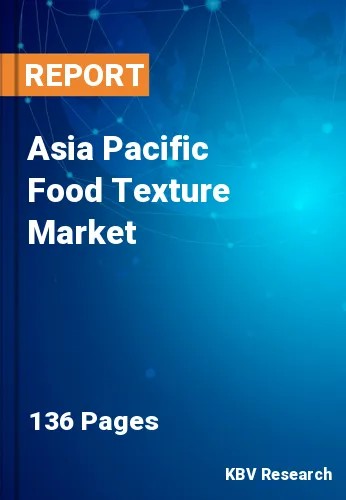Chapter 1. Market Scope & Methodology
1.1 Market Definition
1.2 Objectives
1.3 Market Scope
1.4 Segmentation
1.4.1 Asia Pacific Food Texture Market, by Application
1.4.2 Asia Pacific Food Texture Market, by Product
1.4.3 Asia Pacific Food Texture Market, by Type
1.4.4 Asia Pacific Food Texture Market, by Country
1.5 Methodology for the research
Chapter 2. Market at a Glance
2.1 Key Highlights
Chapter 3. Market Overview
3.1 Introduction
3.1.1 Overview
3.1.1.1 Market Composition and Scenario
3.2 Key Factors Impacting the Market
3.2.1 Market Drivers
3.2.2 Market Restraints
Chapter 4. Competition Analysis - Global
4.1 KBV Cardinal Matrix
4.2 Recent Industry Wide Strategic Developments
4.2.1 Partnerships, Collaborations and Agreements
4.2.2 Product Launches and Product Expansions
4.2.3 Acquisition and Mergers
4.2.4 Geographical Expansions
4.3 Top Winning Strategies
4.3.1 Key Leading Strategies: Percentage Distribution (2019-2023)
4.4 Porter Five Forces Analysis
Chapter 5. Asia Pacific Food Texture Market by Application
5.1 Asia Pacific Dairy Products & Ice Creams Market by Country
5.2 Asia Pacific Confectionery Market by Country
5.3 Asia Pacific Jams Market by Country
5.4 Asia Pacific Layers Market by Country
5.5 Asia Pacific Fillings Market by Country
5.6 Asia Pacific Bakery Market by Country
5.7 Asia Pacific Ready Meals Market by Country
5.8 Asia Pacific Beverage Market by Country
5.9 Asia Pacific Meat Products Market by Country
5.1 Asia Pacific Sauces & Others Market by Country
Chapter 6. Asia Pacific Food Texture Market by Product
6.1 Asia Pacific Natural Market by Country
6.2 Asia Pacific Synthetic Market by Country
Chapter 7. Asia Pacific Food Texture Market by Type
7.1 Asia Pacific Cellulose Derivatives Market by Country
7.2 Asia Pacific Gums Market by Country
7.3 Asia Pacific Inulin Market by Country
7.4 Asia Pacific Gelatins Market by Country
7.5 Asia Pacific Starch Market by Country
7.6 Asia Pacific Dextrins Market by Country
7.7 Asia Pacific Pectins & Others Market by Country
Chapter 8. Asia Pacific Food Texture Market by Country
8.1 China Food Texture Market
8.1.1 China Food Texture Market by Application
8.1.2 China Food Texture Market by Product
8.1.3 China Food Texture Market by Type
8.2 Japan Food Texture Market
8.2.1 Japan Food Texture Market by Application
8.2.2 Japan Food Texture Market by Product
8.2.3 Japan Food Texture Market by Type
8.3 India Food Texture Market
8.3.1 India Food Texture Market by Application
8.3.2 India Food Texture Market by Product
8.3.3 India Food Texture Market by Type
8.4 South Korea Food Texture Market
8.4.1 South Korea Food Texture Market by Application
8.4.2 South Korea Food Texture Market by Product
8.4.3 South Korea Food Texture Market by Type
8.5 Singapore Food Texture Market
8.5.1 Singapore Food Texture Market by Application
8.5.2 Singapore Food Texture Market by Product
8.5.3 Singapore Food Texture Market by Type
8.6 Malaysia Food Texture Market
8.6.1 Malaysia Food Texture Market by Application
8.6.2 Malaysia Food Texture Market by Product
8.6.3 Malaysia Food Texture Market by Type
8.7 Rest of Asia Pacific Food Texture Market
8.7.1 Rest of Asia Pacific Food Texture Market by Application
8.7.2 Rest of Asia Pacific Food Texture Market by Product
8.7.3 Rest of Asia Pacific Food Texture Market by Type
Chapter 9. Company Profiles
9.1 Koninklijke DSM N.V.
9.1.1 Company Overview
9.1.2 Financial Analysis
9.1.3 Segmental and Regional Analysis
9.1.4 Research & Development Expense
9.1.5 Recent strategies and developments:
9.1.5.1 Acquisition and Mergers:
9.1.6 SWOT Analysis
9.2 Archer Daniels Midland Company
9.2.1 Company Overview
9.2.2 Financial Analysis
9.2.3 Segmental and Regional Analysis
9.2.4 Research & Development Expense
9.2.5 Recent strategies and developments:
9.2.5.1 Partnerships, Collaborations, and Agreements:
9.2.5.2 Geographical Expansions:
9.2.6 SWOT Analysis
9.3 Ingredion Incorporated
9.3.1 Company Overview
9.3.2 Financial Analysis
9.3.3 Regional Analysis
9.3.4 Research & Development Expenses
9.3.5 Recent strategies and developments:
9.3.5.1 Product Launches and Product Expansions:
9.3.5.2 Acquisition and Mergers:
9.3.6 SWOT Analysis
9.4 DuPont de Nemours, Inc.
9.4.1 Company Overview
9.4.2 Financial Analysis
9.4.3 Segmental and Regional Analysis
9.4.4 Research & Development Expense
9.4.5 Recent strategies and developments:
9.4.5.1 Product Launches and Product Expansions:
9.4.5.2 Acquisition and Mergers:
9.4.6 SWOT Analysis
9.5 Kerry Group PLC
9.5.1 Company Overview
9.5.2 Financial Analysis
9.5.3 Segmental and Regional Analysis
9.5.4 Research & Development Expenses
9.5.5 Recent strategies and developments:
9.5.5.1 Partnerships, Collaborations, and Agreements:
9.5.5.2 Product Launches and Product Expansions:
9.5.6 SWOT Analysis
9.6 CP Kelco U.S., Inc. (J.M. HUBER)
9.6.1 Company Overview
9.6.2 Recent strategies and developments:
9.6.2.1 Partnerships, Collaborations, and Agreements:
9.6.2.2 Product Launches and Product Expansions:
9.6.3 SWOT Analysis
9.7 Cargill, Incorporated
9.7.1 Company Overview
9.7.2 Recent strategies and developments:
9.7.2.1 Partnerships, Collaborations, and Agreements:
9.7.2.2 Geographical Expansions:
9.7.3 SWOT Analysis
9.8 Jungbunzlauer Suisse AG
9.8.1 Company Overview
9.8.2 SWOT Analysis
9.9 Deosen Biochemical (Ordos) Ltd.
9.9.1 Company Overview
9.10. Euroduna Food Ingredients Gmbh.
9.10.1 Company Overview
9.10.2 SWOT Analysis

